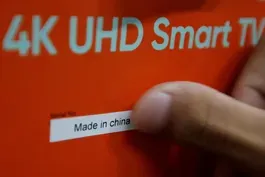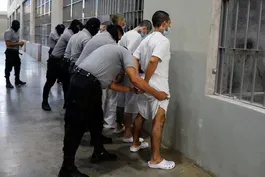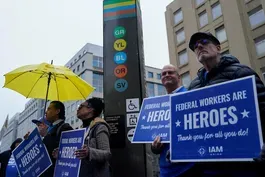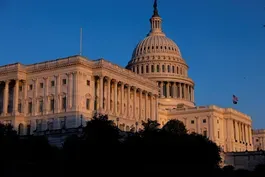
Trade battle 'headed to good spot long-term,' Lankford says
Clip: 4/8/2025 | 6m 34sVideo has Closed Captions
U.S. trade battle 'headed to a good spot long-term,' GOP Sen. Lankford says
As a member of the powerful Senate Finance Committee, Republican Sen. James Lankford of Oklahoma questioned President Trump’s trade representative Jamieson Greer about the president's tariffs. Sen. Lankford joined Amna Nawaz to discuss that issue and his new book, “Turnaround: America's Revival.”
Problems with Closed Captions? Closed Captioning Feedback
Problems with Closed Captions? Closed Captioning Feedback
Major corporate funding for the PBS News Hour is provided by BDO, BNSF, Consumer Cellular, American Cruise Lines, and Raymond James. Funding for the PBS NewsHour Weekend is provided by...

Trade battle 'headed to good spot long-term,' Lankford says
Clip: 4/8/2025 | 6m 34sVideo has Closed Captions
As a member of the powerful Senate Finance Committee, Republican Sen. James Lankford of Oklahoma questioned President Trump’s trade representative Jamieson Greer about the president's tariffs. Sen. Lankford joined Amna Nawaz to discuss that issue and his new book, “Turnaround: America's Revival.”
Problems with Closed Captions? Closed Captioning Feedback
How to Watch PBS News Hour
PBS News Hour is available to stream on pbs.org and the free PBS App, available on iPhone, Apple TV, Android TV, Android smartphones, Amazon Fire TV, Amazon Fire Tablet, Roku, Samsung Smart TV, and Vizio.
Providing Support for PBS.org
Learn Moreabout PBS online sponsorshipAMNA NAWAZ: Let's turn now to Republican Senator James Lankford of Oklahoma.
As a member of the powerful Finance Committee, he questioned President Trump's trade representative, Jamieson Greer, this morning about Trump's controversial tariffs.
Senator Lankford's new book, "Turnaround: America's Revival," is out today, and he joins me now.
Senator, welcome back to the "News Hour."
Thanks for joining us.
SEN. JAMES LANKFORD (R-OK): Thank you.
You bet.
Good to be back when you get.
AMNA NAWAZ: I want to ask you about your wonderful new book, about all the news around tariffs, but I want to begin where Lisa just left off when it comes to this fact that Speaker Mike Johnson does not have the votes to pass that budget blueprint in the House.
What happens next?
Are you still confident that it'll get done before the recess?
SEN. JAMES LANKFORD: I'm hopeful it'll get done.
The budget blueprint is just that.
There's very little detail on it.
The way the House writes a budget blueprint is, it puts what's called a ceiling, here's the top amount that we want to achieve.
The way the Senate writes a budget blueprint is a floor.
We want to do at least this, but we will go much higher.
And I think some in the House are perceiving that the Senate bill is written the same as the House bill.
They're accomplishing the exact same thing.
To tell you the truth, it feels a little bit like we're arguing about where to be able to lean the ladder against the wall to fix the leaky roof.
The problem is not where to lean the ladder.
The problem is the leaky roof.
This bill, the budget outline is just that.
It's just an outline.
It doesn't do anything.
It just gets us started in the process.
The next step deals with the tax policies.
It deals with how do we reduce spending, all those things.
That's the one with the detail.
And, quite frankly, I'm hopeful that we can get to the one that really counts, not this one that's a sheer process document.
AMNA NAWAZ: All right, we will continue to follow.
We hope you come back and join us as that process moves forward.
And, meanwhile, I want to ask you about the big news around tariffs, because earlier today you were able to question the U.S. trade representative today.
You did say that you have heard from a lot of people who are grateful the president is taking these actions, that he's fighting for them.
But you also said most countries in the world are never going to buy as much as we are purchasing.
If you don't believe that these tariffs will erase the trade deficits, how do you square that with President Trump's goals here?
SEN. JAMES LANKFORD: That was actually what I wanted to be able to ask the United States trade representative, several things.
One is, is your goal to increase exports around the world?
Because that's what my farmers and ranchers, that's what manufacturers really want to hear.
And the trade representative was very clear.
Our goal is to increase exports around the world.
Second one was, do we want to negotiate with these different countries where they had these very high tariffs and they're coming?
He was very clear to say, yes, we're trying to negotiate these rates down much lower.
The third piece of that is really the piece that you're trying to be able to ask about as well, is about the kind of the, what's next on this?
Where does this actually go on it?
And what I hear from a lot of people is just tell me the timing because we don't want to be cheated by other countries, but we need to know the timing for the next set of decisions.
They don't have that timing yet, but they said they're actively working on when they're going to get negotiations complete, when they're going to get the next step done, because those things really do matter in all the planning, but they're actively working on it.
And it was very clear the goal is to bring tariffs down and restrictions down around the world.
You're right.
We're not going to have a trade balance with countries much poorer than us when we're the largest economy in the world.
But if they can get restrictions down that, even though that country is not buying as much, at least they're allowing American products in, that does make a difference to us long term.
AMNA NAWAZ: This does remind me of something I read in your book because you talk about people wanting someone who fights for them.
You write this in the book.
You say: "We should never be satisfied with leaders who just fight, but have no plan to win the fight.
Governing means you must win the fight."
What is your understanding of what President Trump's plan is to win this trade war?
What does that mean?
SEN. JAMES LANKFORD: So it's different in every country.
That's the complication.
It's different with, for instance, Vietnam.
Vietnam is someone we traded with a lot.
There's a lot of things that we purchase with garments and electronics and all kinds of things that come out of Vietnam.
But Vietnam has also become a source where China -- to avoid the tariff restrictions from China.
We will send it to Vietnam, repackage it from Vietnam and come to us.
That's a very different issue dealing with Vietnam than it is maybe with Honduras or with Argentina.
Argentina, who blocks access to our beef, is not the same with Vietnam.
So it is very complicated.
They're dealing with a lot of different trade negotiations simultaneously.
That's a lot of balls in the air.
But if they're able to get this done, and I think they will, we're able to resolve 20, 30, 40 different trade agreements in the first, let's say, six months, that would be remarkable to be able to have and would open up a lot of new markets for agriculture, farmers and ranchers, as well as for manufacturing.
So I'm giving them the space to be able to negotiate this out because I do think, even in the complications, they're headed to a good spot long term.
AMNA NAWAZ: As you know, of course, Congress is -- constitutionally has that power of the purse, and a lot of the president's actions have circumvented that power.
It is relevant again to something you write in the book when you talk about our problems in America.
You say: "Our problems occur when we don't follow our Constitution, the endless executive orders, the regulatory chaos."
"The unwillingness of Congress to do its job show our weaknesses, not our constitutions."
As you know, the president signed a record number of executive orders in his early days.
Congressional Republicans have not challenged that.
Is that showing weakness here?
Is that creating problems?
SEN. JAMES LANKFORD: It's Actually not.
The logical place where that's actually done in our checks and balances is actually done in the courts.
And as we have seen even as recently as the last 24 hours, the courts are looking at each of these actions.
They're examining it, trying to determine, is this appropriate, consistent with the law or not?
Congress gives opinions on that.
But, ultimately, we write law.
Constitutionally, all the way back to Marbury v. Madison, the courts actually say what the law is.
So when you talk about checks and balances, when an executive action is written, Congress can actually say I agree or disagree with that.
But the courts will actually determine if it's consistent with the law.
Most of these cases already for executive actions that the president has done, the courts have done a check on it and said, yes, that's consistent with the law.
And that's what has been appropriate.
And President Trump has said over and over again he's going to follow court orders.
Now, he clearly disagrees with some court orders, as many people do on different issues, but he has followed the court all the way through.
And that's important for our republic, quite frankly.
AMNA NAWAZ: Senator, a lot more to talk about.
We hope you will come back and join us again soon.
Your new book, "Turnaround: America's Revival," is out now.
That is Republican Senator James Lankford of Oklahoma.
Thank you, sir.
Good to see you.
SEN. JAMES LANKFORD: Thank you.
Good to see you again as well.
Analyst breaks down China’s response to Trump’s trade war
Video has Closed Captions
Analyst breaks down China’s response to Trump’s trade war (6m 28s)
Conditions in the prison where deported migrants are held
Video has Closed Captions
The conditions inside the infamous El Salvador prison where deported migrants are held (5m 1s)
Global economies teeter with tariffs set to go into effect
Video has Closed Captions
Global economies hang in the balance with Trump's tariffs set to officially go into effect (4m 17s)
Man whose blood helped develop measles vaccine on skepticism
Video has Closed Captions
Man whose blood helped develop measles vaccine weighs in on recent outbreak (5m 51s)
News Wrap: Supreme Court blocks federal worker reinstatement
Video has Closed Captions
News Wrap: Supreme Court blocks reinstatement of federal workers fired by Trump (5m 56s)
Some House Republicans reject GOP Senate budget plan
Video has Closed Captions
Amid tariff turmoil, House Republicans face critical moment for Trump’s agenda (4m 6s)
Supreme Court clears way for Alien Enemies Act deportations
Video has Closed Captions
Supreme Court clears way for deportations under Alien Enemies Act (5m 10s)
Taiwan watches Ukraine war, fearing similar move from China
Video has Closed Captions
Taiwan closely watches Ukraine war, fearing China could attempt a similar takeover (8m 4s)
Providing Support for PBS.org
Learn Moreabout PBS online sponsorshipSupport for PBS provided by:
Major corporate funding for the PBS News Hour is provided by BDO, BNSF, Consumer Cellular, American Cruise Lines, and Raymond James. Funding for the PBS NewsHour Weekend is provided by...



















